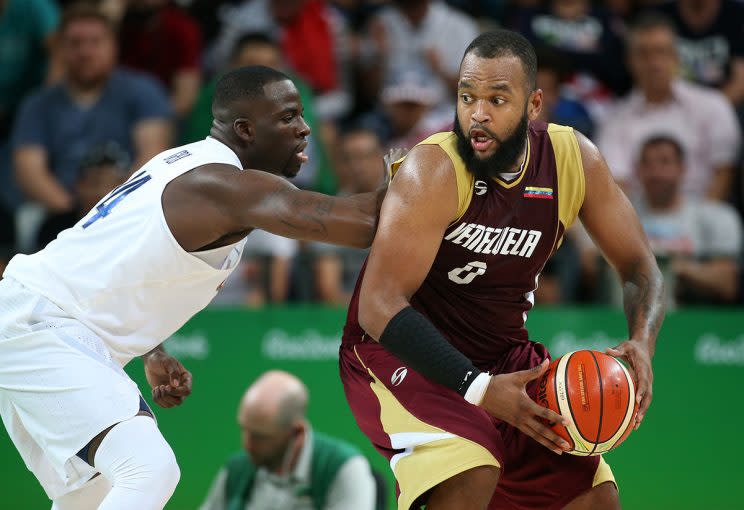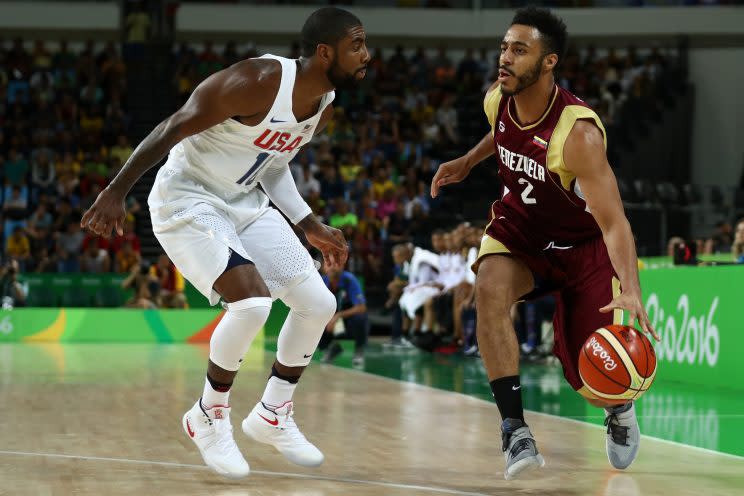How Venezuela's 44-point loss to the U.S. felt like a win


Iron Lady wins in an upset | King wins battle of USA vs. Russia | Murphy sets Olympic record
RIO DE JANEIRO — This wasn’t a 16 seed beating a 1. This was a 16,000 seed. This was the greatest upset that ever would be, the Miracle on Maple, the one thing that could unite a nation divided by politics. And for 12 minutes on Monday, when Venezuela hung with the United States men’s basketball team on an Olympic court – when up was down, right was left and Russia was clean – the splendor of the Games truly revealed itself.
It mattered little that for the final 27 and a half minutes of the game the United States remembered it was a team of 11 NBA All-Stars (and Harrison Barnes) facing a group of pros from a D-level league, plunged the nitrous button and ran away with a 113-69 victory at Carioca Arena 1. Disappointed though they were, the Venezuelans always will be able to say they not only played against an American powerhouse but tied it through a quarter and pushed Team USA for a few minutes more after that.
The Olympics are about winning – winning for country, winning for self, winning medals. There is great dignity in losing, though, and Venezuela lost in the most enviable fashion: to a superior team, yes, but without awe in its eyes or fear in its heart.
[Related: Kobe Bryant’s Venezuelan cousin is unsurprisingly shot happy]
Team USA was taller and stronger than Venezuela. It jumped higher and ran faster and shot better. It blocked shots with more ferocity and passed with more crispness and dunked with backboard-shaking savagery. If the United States doesn’t win gold, it will be a huge failure. Venezuela is just playing for the second round, to show that it belongs, not only in the Olympics but on the same court as the U.S.
“We believe in what we do,” said Greg Echenique, the Venezuelan center who played collegiately at Creighton. “We know they’re a great team. It’s good for morale, team confidence. We always say we feel like we can play evenly with anybody.”

It was 18-18 after the first quarter. Even. The U.S. led 24-22 two minutes into the second. Even enough. And whether it’s possible for another more talented team to mimic Venezuela’s game plan, it worked to near-perfection for those first 12 minutes: Try to beat up the bigger, badder Americans. The Venezuelans were cannonball-off-the-roof fearless. Echenique got DeMarcus Cousins into foul trouble that he never shook, getting DQ’d in less than nine minutes on the court, like he was trying to do his best Bubba Wells imitation.
“We were just going to try to fight, be physical, because we’re small,” said John Cox, who led Venezuela with 19 points on 6-for-20 shooting. “I thought we did good for most of the game. But U.S.A. is just long, athletic, talented. They can change so many guys. It’s hard to stay with them for 40 minutes.”
That 24-22 deficit was 31-22 three minutes later, 41-24 five minutes later and 48-26 at halftime. The expected rout took time to materialize, but it was on, and Venezuela’s chances of advancing past the qualifying stage looks grim at this point, with games against France and Australia following their Wednesday showdown with China at 9:30 p.m. EST.
They’ll always have Monday, always have those 12 minutes in which they showed up without the one NBA player on their roster and ran in lockstep with the Americans. In the 24 years since Venezuela had qualified for Olympic basketball, the sport has taken leaps forward domestically. Venezuela is a baseball country – it gave the world Miguel Cabrera, Felix Hernandez, Jose Altuve, Victor Martinez, Carlos Gonzalez, Salvador Perez and Luis Aparicio – but the world’s stage is a mighty good way to recruit basketball players, especially with the leftover policies of Hugo Chavez still splintering the nation.
For one night, at least, its basketball team offered relief. Beating a talented Argentinian team last year in the FIBA Americas Championship gave Venezuela its ticket to Rio. And even if its lone NBA player, Greivis Vasquez, didn’t make it – his team, the Brooklyn Nets, preferred his first action back following December ankle surgery didn’t come with another team – Venezuela acted liked it didn’t miss him.
[Related: Why an Olympic sailor is more worried about the food in his country than the water in Rio]
This was nothing personal. It’s just the stance any team that wants to run with the U.S. must adopt. When the expectation is slaughter – when keeping the margin of victory under 50 points is optimal – no single person can intimidate, no single team terrify.
“You kinda wanna feel like you’re on the same page with them, even though they’re superstars and all these great things,” Echenique said. “I try to approach it like: They’re humans, just like we are.”
They were the same for 12 minutes. Greg Echenique was not off-brand Big Baby Davis. He was Greg Echenique, Venezuelan Olympian, fighter. John Cox was not Kobe Bryant’s cousin. He was John Cox, Venezuelan Olympian, shooter. David Cubillan was not Jimmy Butler’s teammate at Marquette. He was David Cubillan, Venezuelan Olympian, dreamer.
“It’s amazing for us, amazing for all the people who know us,” Cubillan said. “I know we’re making a lot of people proud.”
Ultimately, that pride is all Cubillan and his teammates took from the arena Monday. There would be no miracle, no greatest ever, no upset. Just 12 minutes, for self and for country, that made a 44-point loss feel just a little like a win.


